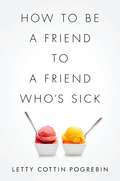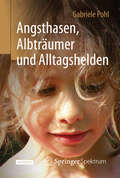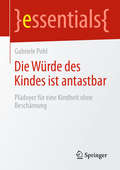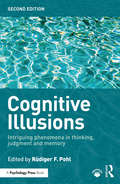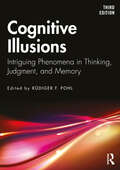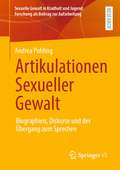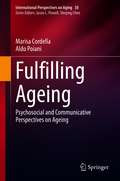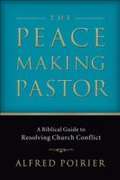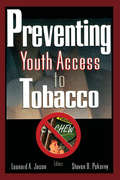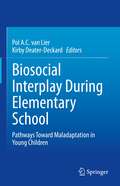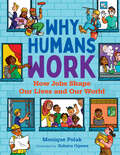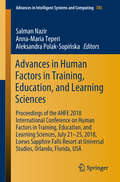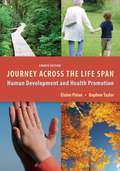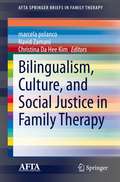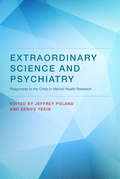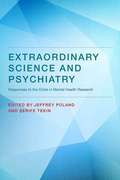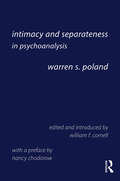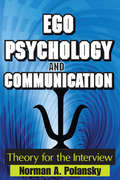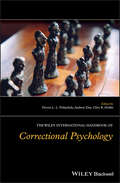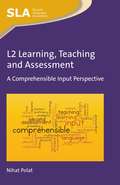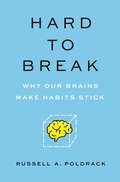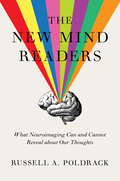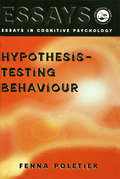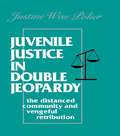- Table View
- List View
How to Be a Friend to a Friend Who's Sick
by Letty Cottin PogrebinEveryone knows someone whoOCOs sick or suffering. Yet when a friend or relative is under duress many of us feel uncertain about how to cope. Throughout her recent bout with breast cancer, Letty Cottin Pogrebin became fascinated by her friendsOCO and familyOCOs diverse reactions to her and her illness: how awkwardly some of them behaved; how some misspoke or misinterpreted her needs; and how wonderful it was when people read her right. She began talking to her fellow patients and dozens of other veterans of serious illness, seeking to discover what sick people wished their friends knew about how best to comfort, help, and even simply talk to them. Now Pogrebin has distilled their collective stories and opinions into this wide-ranging compendium of pragmatic guidance and usable wisdom. Her advice is always infused with sensitivity, warmth, and humor. It is embedded in candid stories from her own and othersOCO journeys, and their sometimes imperfect interactions with well-meaning friends. "How to Be a Friend to a Friend WhoOCOs Sick" is an invaluable guidebook for anyone hoping to rise to the challenges of this most important and demanding passage of friendship.
Angsthasen, Albträumer und Alltagshelden
by Gabriele PohlDieses Buch schildert anschaulich die Entängstigungsstrategien von Kindern. Anhand von zahlreichen Beispielen und gespielten Geschichten von Kindern in der Therapie verdeutlicht die Autorin, wie Kinder ihre Ängste durch das freie Spiel verarbeiten. Sie zeigt auf, wie klug das Unterbewusstsein des Kindes Lösungsmöglichkeiten bereit hält und ,,weiß" welcher nächste Entwicklungsschritt ansteht. Dabei wird der Leser mit wunderbaren, poetischen Märchenbildern beschenkt, die aus der Imaginationskraft der Kinder gespeist sind. Lassen Sie sich ein auf diese Entdeckungsreise, denn dadurch kann der Blick für die wirklichen Bedürfnisse von Kindern geschärft werden. Eltern und Pädagogen erhalten darüber hinaus ein besseres Verständnis für die Symbolsprache des Spielens.
Die Würde des Kindes ist antastbar: Plädoyer für eine Kindheit ohne Beschämung (essentials)
by Gabriele PohlKinder haben ein Recht auf gewaltfreie Erziehung und seine Einhaltung ist unabdingbar für die freie Entfaltung ihrer Persönlichkeit. Beschämung, Herabsetzung, Demütigung können schwerwiegende Folgen für die Psyche des Kindes haben. Psychische Gewalt in diesem Sinne wird aber oft nicht als solche erkannt, denn sie hinterlässt keine offensichtlichen Narben. Aus Hilflosigkeit, wider besseres Wissen oder aus einem technokratischen Menschenbild heraus werden herabwürdigende Erziehungsmaßnahmen in der Familie und in den Institutionen angewandt. In den Medien werden zunehmend Menschen vorgeführt und beschämt. Fragwürdige Erziehungsmethoden werden dort propagiert. In Youtube-Videos werden Kinder der Lächerlichkeit preisgegeben. Konditionierung ist kein menschengemäßes Erziehungsmittel. Die Menschenwürde entsteht aus dem Moment der Freiheit. Gabriele Pohl fragt in diesem essential, wie die Bedingungen sein müssen, die die Würde der Kinder und der Jugendlichen achten.
Cognitive Illusions: Intriguing Phenomena in Judgement, Thinking and Memory
by Rüdiger F PohlCognitive Illusions explores a wide range of fascinating psychological effects in the way we think, judge and remember in our everyday lives. Featuring contributions from leading researchers, the book defines what cognitive illusions are and discusses their theoretical status: are such illusions proof for a faulty human information-processing system, or do they only represent by-products of otherwise adaptive cognitive mechanisms? Throughout the book, background to phenomena such as illusions of control, overconfidence and hindsight bias are discussed, before considering the respective empirical research, potential explanations of the phenomenon, and relevant applied perspectives. Each chapter also features the detailed description of an experiment that can be used as classroom demonstration. <P><P>Featuring six new chapters, this edition has been thoroughly updated throughout to reflect recent research and changes of focus within the field. <P><P>This book will be of interest to students and researchers of cognitive illusions, specifically, those focusing on thinking, reasoning, decision-making and memory.
Cognitive Illusions: Intriguing Phenomena in Thinking, Judgment, and Memory
by Rüdiger F. PohlCognitive Illusions explores a wide range of fascinating psychological effects in the way we think, judge and remember in our everyday lives. In this volume, Rüdiger F. Pohl brings together leading international researchers to define what cognitive illusions are and discuss their theoretical status: are such illusions proof of a faulty human information-processing system, or do they only represent by-products of otherwise adaptive cognitive mechanisms? The book describes and discusses 26 different cognitive illusions, with each chapter giving a profound overview of the respective empirical research including potential explanations, individual differences, and relevant applied perspectives. This edition has been thoroughly updated throughout, featuring new chapters on negativity bias, metacognition, and how we respond to fake news, along with detailed descriptions of experiments that can be used as classroom demonstration in every chapter. Demonstrating just how diverse cognitive illusions can be, it is a must read for all students and researchers of cognitive illusions, specifically, those focusing on thinking, reasoning, decision-making, and memory.
Artikulationen Sexueller Gewalt: Biographien, Diskurse und der Übergang zum Sprechen (Sexuelle Gewalt in Kindheit und Jugend: Forschung als Beitrag zur Aufarbeitung)
by Andrea PohlingNicht erst seit dem Jahr 2010 wird über das Thema der sexuellen Gewalt geforscht und gesprochen. Aber wie sprechen betroffene Menschen in biographischen Interviews über ihre Erfahrungen sexueller Gewalt in Kindheit und Jugend? Und wie gehen sie im Verlauf ihres Lebens dazu über, über diese Erfahrungen zu sprechen oder wenden sich davon ab? Die Studie leistet einen Beitrag zu einer erziehungswissenschaftlich ausgerichteten Gewaltforschung in Anlehnung an das Konzept der Artikulation. Sie zeigt auf, wie der Übergang zum Sprechen über sexuelle Gewalt in Kindheit und Jugend in diskursive und gesellschaftliche Verhältnisse einerseits sowie in biographische Erfahrungen und Bearbeitungsstrategien andererseits eingebunden ist. Vor diesem Hintergrund wird die Vielfältigkeit „des“ Sprechens über Sexuelle Gewalterfahrungen beleuchtet und verschiedene Modi der Artikulation Sexueller Gewalt vorgestellt. Auf der Grundlage von drei Falldarstellungen wird der Übergang zum Sprechen als mehrdimensionaler, nicht-linearer und relationalerProzess definiert.Die AutorinAndrea Pohling ist wissenschaftliche Mitarbeiterin an der Goethe-Universität Frankfurt am Main am Institut für Sozialpädagogik und Erwachsenenbildung. Ihre Arbeitsschwerpunkte und Forschungsinteressen sind Kindheits- und Jugendforschung, Forschung im Kontext der Themen Sexualität, (sexuelle) Gewalt und Diskurse, Methoden qualitativer Sozialforschung sowie forschungsethische Fragen und Spannungsfelder.
Fulfilling Ageing: Psychosocial and Communicative Perspectives on Ageing (International Perspectives on Aging #30)
by Aldo Poiani Marisa CordellaThis book explores the reality of ageing and old age from the perspectives of the individual and society. It emphasizes cross-cultural aspects of ageing and communication issues both within and across generations. The authors approach the understanding of ageing from a multi-disciplinary perspective, integrating biology, psychology, linguistics, sociology, and history. The book is organized as follows: historical and broader cross-cultural issues of ageing, followed by biomedical, psychological, social, and communicative aspects of ageing. The book concludes with an in-depth analysis of the existential dimension of ageing followed by an evolutionary perspective.
The Peacemaking Pastor: A Biblical Guide to Resolving Church Conflict
by Alfred PoirierEvery pastor faces conflict in the church, and Alfred Poirier has this loving reminder: we can run, but we can't hide. Jesus set the example as the Incarnate Peacemaker, and Scripture clearly calls his servant-pastors to be ministers of reconciliation. So the issue is not whether to be a mediator but what kind of mediator to be.
Preventing Youth Access to Tobacco
by Steven Pokorny Leonard JasonLearn to develop and assess comprehensive youth tobacco interventions!Preventing Youth Access to Tobacco examines the components of a preventive public health intervention directed at reducing the rate of youth tobacco use. This valuable book describes this innovative intervention, which involves making tobacco more difficult for young people to acquire and also calls for fines for possession of tobacco. It illustrates the rationale for this intervention and reviews the literature on the topic, pointing to findings that indicate that this kind of comprehensive intervention has been shown to be effective.From the editors: “The amount of human pain and suffering caused by tobacco use is immeasurable. Preventing youth smoking initiation of the most effective way of reducing long-term mortality from heart disease, chronic lung disease, and other tobacco-related disorders. Smoking is the leading preventable cause of death in the United States, killing over 400,000 people each year. This is more people than die of AIDS, homicide, suicide, automobile accidents, illegal drug use, and fires combined. Despite these facts, 22.9 of adult Americans and 13.8 of Americans under 18 smoke cigarettes.”This essential book can provide some much-needed answers, showing you: effective ways of reducing the rate of regular smoking among adolescents how to assess a community&’s readiness to change how to gauge the effectiveness of tobacco laws directed toward youth how to judge the comprehensiveness of school-based tobacco interventions what factors influence illegal tobacco sales to minors why merchants sell tobacco to kids illegally and what the legal risks are for minors who try to buy tobacco
Biosocial Interplay During Elementary School: Pathways Toward Maladaptation in Young Children
by Pol A. C. van Lier Kirby Deater-DeckardThis book examines the effects of social relations during primary school on children’s neurobiology and pathways to maladaptation. It explores the ways in which after the transition to primary education children, supervised by teachers, need to function with their peers. The volume addresses issues affecting 10% to 20% of children who become poorly accepted or victimized by peers, receive low support by teachers or even have conflictual relations with teachers, and may perceive the classroom as a whole as nonsupportive. Key areas of coverage include:Detrimental effects of such social experiences, providing an overview of how such experiences affect children’s neurobiology factors to understand why these children develop maladaptive outcomes.Manifestations of social relations, their complexity, interrelations, and pathways leading to the maladaptive outcomes.How genetic factors may evoke children’s social environment and make them susceptible to its impact (e.g., findings on DNA methylation at both epigenome-wide level as well as on particular loci on candidate genes).Links between social environmental stressors and the psychophysiology of elementary school children and reviews both links with the autonomic nervous system as well as with the HPA-axis.The impact of social experiences on neurocognitive function development, decision making, and structural and functional brain development and discusses implications for research, prevention, and intervention. Biosocial Interplay During Elementary School is a must-have resource for researchers, professors, and graduate students as well as clinicians and other professionals in clinical child, school, and developmental psychology, educational psychology/policy and politics, social work, neuroscience, public health, and all related disciplines.
Why Humans Work: How Jobs Shape Our Lives and Our World (Orca Think #6)
by Monique PolakWhat do you want to be when you grow up? I bet you've been asked that question before. But have you ever thought about why humans work? There are almost 3.5 billion people working in the world today, and that number is growing. In Why Do We Work? author Monique Polak investigates the past, present and future of jobs, including how work has also been shaped by discrimination, privilege and child labor. Meet a variety of working professionals and explore why we have careers, vocations and professions. How is the way we work changing, and what will it look like in the future?
Advances in Human Factors in Training, Education, and Learning Sciences: Proceedings of the AHFE 2018 International Conference on Human Factors in Training, Education, and Learning Sciences, July 21-25, 2018, Loews Sapphire Falls Resort at Universal Studios, Orlando, Florida, USA (Advances in Intelligent Systems and Computing #785)
by Aleksandra Polak-Sopińska Anna-Maria Teperi Salman NazirThis book focuses on the importance of human factors in optimizing the learning and training process. It reports on the latest research and best practices and discusses key principles of behavioral and cognitive science, which are extremely relevant to the design of instructional content and new technologies to support mobile and multimedia learning, virtual training and web-based learning, among others, as well as performance measurements, social and adaptive learning and many other types of educational technologies, with a special emphasis on those important in the corporate, higher education, and military training contexts. Based on the AHFE 2018 Conference on Human Factors in Training, Education, and Learning Sciences, held July 21–25, 2018 in Orlando, Florida, USA on July 21–25, 2018, the book offers a timely perspective on the role of human factors in education. It highlights important new ideas and will fosters new discussions on how to optimally design learning experiences.
Journey Across the Life Span: Human Development and Health Promotion
by Elaine U. Polan Daphne R. TaylorAs health care delivery changes, there is a growing emphasis on health promotion, maintenance, and restoration for individuals in a variety of settings. Elaine Polan and Daphne Taylor s book addressees those needs as it guides students through the life cycle from conception to old age. Through user-friendly chapters and new, four-color presentation, they provide LPN/LVN students with a complete review of growth and development across the lifespan.
Bilingualism, Culture, and Social Justice in Family Therapy (AFTA SpringerBriefs in Family Therapy)
by Marcela Polanco Navid Zamani Christina Da Hee KimThis volume advocates for justice in language rights through its explorations of bilingualism in family therapy, from the perspectives of eighteen languages identified by the authors: Black Talk/Ebonics/Slang, Farsi, Fenglish, Arabic, Italian, Cantonese Chinese, South Korean, Mandarin Chinese, Vietnamese, Spanish, Chilean Spanish, Mexican Spanish, Colombian Spanglish, Madrileño Spanish, Spanglish, Pocho Spanish, Colloquial Spanish, and English. It identifies standard English as the current language most often used across family therapy programs and services in the United States. The book discusses efforts to respond to the rapidly changing linguistic landscape and the increasingly high demand for appropriate therapy services that respond effectively to diverse families in America. It discusses recruitment and training of linguistically diverse family therapists and strategies to promote linguistic equality to support the rights of family therapists, their practices, and the communities they serve. Chapters explore ways to integrate languages in professional and personal lives, including the improvisational, self-taught translanguaging skills and practices that go beyond the lexical and grammatical rules of a language. The book describes the creative use of native or heritage languages to ensure that the juxtaposition of English therapeutic and daily-life landscapes is integrated into family therapy settings. It discusses contextual, relational, therapeutic, and training potential offered by bilingualism as well as the necessary transmutations in theory and practice. This volume is an essential resource for clinicians, therapists, and practitioners as well as researchers, professors, and graduate students in family studies, clinical psychology, and public health as well as all interrelated disciplines.
Extraordinary Science and Psychiatry: Responses to the Crisis in Mental Health Research (Philosophical Psychopathology)
by Jeffrey Poland Şerife TekinLeading scholars offer perspectives from the philosophy of science on the crisis in psychiatric research that exploded after the publication of DSM-5.Psychiatry and mental health research is in crisis, with tensions between psychiatry's clinical and research aims and controversies over diagnosis, treatment, and scientific constructs for studying mental disorders. At the center of these controversies is the Diagnostic and Statistical Manual of Mental Disorders (DSM), which—especially after the publication of DSM-5—many have found seriously flawed as a guide for research. This book addresses the crisis and the associated “extraordinary science” (Thomas Kuhn's term for scientific research during a state of crisis) from the perspective of philosophy of science. The goal is to help reconcile the competing claims of science and phenomenology within psychiatry and to offer new insights for the philosophy of science. The contributors discuss the epistemological origins of the current crisis, the nature of evidence in psychiatric research, and the National Institute for Mental Health's Research Domain Criteria project. They consider particular research practices in psychiatry—computational, personalized, mechanistic, and user-led—and the specific categories of schizophrenia, depressive disorder, and bipolar disorder. Finally, they examine the DSM's dubious practice of pathologizing normality.ContributorsRichard P. Bentall, John Bickle, Robyn Bluhm, Rachel Cooper, Kelso Cratsley, Owen Flanagan, Michael Frank, George Graham, Ginger A. Hoffman, Harold Kincaid, Aaron Kostko, Edouard Machery, Jeffrey Poland, Claire Pouncey, Şerife Tekin, Peter Zachar
Extraordinary Science and Psychiatry: Responses to the Crisis in Mental Health Research
by Jeffrey Poland Serife TekinPsychiatry and mental health research is in crisis, with tensions between psychiatry's clinical and research aims and controversies over diagnosis, treatment, and scientific constructs for studying mental disorders. At the center of these controversies is the Diagnostic and Statistical Manual of Mental Disorders (DSM), which -- especially after the publication of DSM-5 -- many have found seriously flawed as a guide for research. This book addresses the crisis and the associated "extraordinary science" (Thomas Kuhn's term for scientific research during a state of crisis) from the perspective of philosophy of science. The goal is to help reconcile the competing claims of science and phenomenology within psychiatry and to offer new insights for the philosophy of science. The contributors discuss the epistemological origins of the current crisis, the nature of evidence in psychiatric research, and the National Institute for Mental Health's Research Domain Criteria project. They consider particular research practices in psychiatry -- computational, personalized, mechanistic, and user-led -- and the specific categories of schizophrenia, depressive disorder, and bipolar disorder. Finally, they examine the DSM's dubious practice of pathologizing normality.ContributorsRichard P. Bentall, John Bickle, Robyn Bluhm, Rachel Cooper, Kelso Cratsley, Owen Flanagan, Michael Frank, George Graham, Ginger A. Hoffman, Harold Kincaid, Aaron Kostko, Edouard Machery, Jeffrey Poland, Claire Pouncey, Serife Tekin, Peter Zachar
Intimacy and Separateness in Psychoanalysis
by Warren S. PolandClinical psychoanalysis serves as our best laboratory for exploring the riddle of what it is to be a person, and how a person is at once singularly unique while always a piece of the interpersonal fabric of humanity. In Intimacy and Separateness in Psychoanalysis, Warren Poland casts a freshly erudite eye on this paradox, resisting individual or intersubjective bias and avoiding the parochial allegiances common in our age of pluralism. Poland combines vivid reports from clinical analyses, literary readings, and his own life – all unfolding original observations on a person as both a part of and apart from human commonality. His consideration of how one person’s witnessing facilitates another’s self-definition, a concept extended here in his study of outsiderness as part of human nature, has been marked a keynote contribution. Clinical illustrations of moments that matter but are usually omitted from public presentation are set alongside examples of reading powerful fiction to show how analyst and author both incite fresh openness in a person’s mind. Poland goes farther, exposing the personal power of union and separateness in its keenest form, facing the ultimate separation of one’s own actual death. Only with separateness can true intimacy grow, and only within the fabric of others can true individuality exist. This evocative book, ranging from the lightness of whimsy to the dread of dying, allows every reader to taste of and learn from Poland’s thinking. Psychoanalyst or patient, writer or reader, each one living one’s own life – all can find new understandings in this work.
Ego Psychology and Communication: Theory for the Interview
by Norman PolanskyWriting in a lively straightforward tone and offering numerous examples, Polansky demonstrates that verbal communication plays a major role in mental health and is essential to preventing and curing emotional disorders. He shows why the inability to achieve effective speech reflects neurosis, interferes with self-healing potentials in the personality, and hampers patients in their efforts to make use of any of the talking therapies. He also makes clear how verbal expression leads to the growth of intimacy between people on a mature organized level and guards the individual against the existential anxiety of being completely alone in a potentially meaningless universe.Synthesizing basic theory that underlies skilled interviewing, the book serves as an introduction to ego psychology. It offers an appraisal of the role of verbal communication, especially in casework, individual therapy, and counseling, as well as in most group treatments situations. The author covers such topics as the resiliency of the ego, the logic of defenses, coping mechanisms, and the theory of object relations. He provides numerous illustrations of specific security and distance maneuvers found in everyday practice. He also describes techniques for dealing with these maneuvers by patients in face-to-face situations.This book is as vital to the field as when it first appeared in 1971. Polansky summarizes major concepts of modern ego psychology and relates them to what is known today about the process of verbal communication. It will be especially useful for those who seek to understand and treat the human personality through speech. Ego Psychology and Communication is designed for courses in social work, clinical psychology, educational counseling, guidance, and psychiatric nursing. Practitioners in social work, psychology, and psychiatry will find it to be a valuable addition to their personal reference libraries.
The Wiley International Handbook of Correctional Psychology
by Devon L. L. Polaschek Andrew Day Clive R. HollinA two-volume handbook that explores the theories and practice of correctional psychology With contributions from an international panel of experts in the field, The Wiley International Handbook of Correctional Psychology offers a comprehensive and up-to-date review of the most relevant topics concerning the practice of psychology in correctional systems. The contributors explore the theoretical, professional and practical issues that are pertinent to correctional psychologists and other professionals in relevant fields. The Handbook explores the foundations of correctional psychology and contains information on the history of the profession, the roles of psychology in a correctional setting and examines the implementation and evaluation of various interventions. It also covers a range of topics including psychological assessment in prisons, specific treatments and modalities as well as community interventions. This important handbook: Offers the most comprehensive coverage on the topic of correctional psychology Contains contributions from leading experts from New Zealand, Australia, Europe, and North America Includes information on interventions and assessments in both community and imprisonment settings Presents chapters that explore contemporary issues and recent developments in the field Written for correctional psychologists, academics and students in correctional psychology and members of allied professional disciplines, The Wiley International Handbook of Correctional Psychology provides in-depth coverage of the most important elements of the field.
L2 Learning, Teaching and Assessment: A Comprehensible Input Perspective
by Nihat PolatThis book explores second language (L2) learning, teaching and assessment from a comprehensible input (CI) perspective. This focus on the role of input is important for deepening our understanding of interactions between the learner, teacher and the environment as well as of the nature of the learning, teaching and assessment processes. The book takes a blended approach that promotes the intertwining of theory, research and practice in L2 pedagogy and assessment and aims to address the commonly used concept of CI and its role in L2 education. Content includes a comprehensive discussion of the conceptual foundation of CI; a multimodal and dynamic interpretation of CI from numerous perspectives; a critical discussion of well-known L2 acquisition theories and research; a practical examination of the role of multimodal forms of CI in L2 pedagogy; an analytical review of factors to be considered when modifying CI for pedagogical purposes in different settings and an overview of CI in L2 assessment. It will be of interest to students in the fields of L2 learning, teaching and assessment, teachers in second/foreign language settings and researchers of SLA and teacher education.
Devil in Ohio
by Daria Polatin"Devil in Ohio kept me up until 3 a.m. with the lights on–in a good way. It’s a haunting thriller for readers who like fear, humor, and heart in one package."—Meredith Goldstein, advice columnist and feature reporter for The Boston Globe, author of upcoming YA novel Chemistry Lessons."Gripping, urgent and addictive, Devil in Ohio balances the dark exploration of cults with a compelling and often humorous take on teen social dynamics. This is the debut you won’t want to miss."—Aditi Khorana, author of critically acclaimed The Library of Fates and Mirror in the SkyWhen fifteen-year-old Jules Mathis comes home from school to find a strange girl sitting in her kitchen, her psychiatrist mother reveals that Mae is one of her patients at the hospital and will be staying with their family for a few days. But soon Mae is wearing Jules’s clothes, sleeping in her bedroom, edging her out of her position on the school paper, and flirting with Jules’s crush. And Mae has no intention of leaving.Then things get weird.Jules walks in on a half-dressed Mae, startled to see: a pentagram carved into Mae’s back. Jules pieces together clues and discovers that Mae is a survivor of the strange cult that’s embedded in a nearby town. And the cult will stop at nothing to get Mae back.
Hard to Break: Why Our Brains Make Habits Stick
by Russell A. PoldrackThe neuroscience of why bad habits are so hard to break—and how evidence-based strategies can help us change our behavior more effectivelyWe all have habits we’d like to break, but for many of us it can be nearly impossible to do so. There is a good reason for this: the brain is a habit-building machine. In Hard to Break, leading neuroscientist Russell Poldrack provides an engaging and authoritative account of the science of how habits are built in the brain, why they are so hard to break, and how evidence-based strategies may help us change unwanted behaviors.Hard to Break offers a clear-eyed tour of what neuroscience tells us about habit change and debunks “easy fixes” that aren’t backed by science. It explains how dopamine is essential for building habits and how the battle between habits and intentional goal-directed behaviors reflects a competition between different brain systems. Along the way, we learn how cues trigger habits; why we should make rules, not decisions; how the stimuli of the modern world hijack the brain’s habit machinery and lead to drug abuse and other addictions; and how neuroscience may one day enable us to hack our habits. Shifting from the individual to society, the book also discusses the massive habit changes that will be needed to address the biggest challenges of our time.Moving beyond the hype to offer a deeper understanding of the biology of habits in the brain, Hard to Break reveals how we might be able to make the changes we desire—and why we should have greater empathy with ourselves and others who struggle to do so.
The New Mind Readers: What Neuroimaging Can and Cannot Reveal about Our Thoughts
by Russell A. PoldrackA revealing insider’s account of the power—and limitations—of functional MRIThe ability to read minds has long been a fascination of science fiction, but revolutionary new brain-imaging methods are bringing it closer to scientific reality. The New Mind Readers provides a compelling look at the origins, development, and future of these extraordinary tools, revealing how they are increasingly being used to decode our thoughts and experiences—and how this raises sometimes troubling questions about their application in domains such as marketing, politics, and the law.Russell Poldrack takes readers on a journey of scientific discovery, telling the stories of the visionaries behind these breakthroughs. Along the way, he gives an insider’s perspective on what is perhaps the single most important technology in cognitive neuroscience today—functional magnetic resonance imaging, or fMRI, which is providing astonishing new insights into the contents and workings of the mind. He highlights both the amazing power and major limitations of these techniques and describes how applications outside the lab often exceed the bounds of responsible science. Poldrack also details the unique and sometimes disorienting experience of having his own brain scanned more than a hundred times as part of a landmark study of how human brain function changes over time.Written by one of the world’s leading pioneers in the field, The New Mind Readers cuts through the hype and misperceptions surrounding these emerging new methods, offering needed perspective on what they can and cannot do—and demonstrating how they can provide new answers to age-old questions about the nature of consciousness and what it means to be human.
Hypothesis-testing Behaviour (Essays in Cognitive Psychology)
by Fenna H. PoletiekHow do people search evidence for a hypothesis? A well documented answer in cognitive psychology is that they search for confirming evidence. However, the rational strategy is to try to falsify the hypothesis. This book critically evaluates this contradiction. Experimental research is discussed against the background of philosophical and formal theories of hypothesis testing with striking results: Falsificationism and verificationism - the two main rival philosophies of testing - come down to one and the same principle for concrete testing behaviour, eluding the contrast between rational falsification and confirmation bias. In this book, the author proposes a new perspective for describing hypothesis testing behaviour - the probability-value model - which unifies the contrasting views. According to this model, hypothesis testers pragmatically consider what evidence and how much evidence will convince them to reject or accept the hypothesis. They might either require highly probative evidence for its acceptance, at the risk of its rejection, or protect it against rejection and go for minor confirming observations. Interestingly, the model refines the classical opposition between rationality and pragmaticity because pragmatic considerations are a legitimate aspect of 'rational' hypothesis testing. Possible future research and applications of the ideas advanced are discussed, such as the modelling of expert hypothesis testing.
Juvenile Justice in Double Jeopardy: The Distanced Community and Vengeful Retribution
by The Honorable PolierThroughout her entire career, Judge Polier continually fought for the rights and needs of the poor. In this volume she describes the granting and denial of justice toward the poor -- particluarly poor children -- she observed during her tenure as a Family Court Judge in New York City. The book discusses the current state of the justice system and the outlook for the future. This volume helps readers understand how broadly shared the responsibility for the neglect of today's youth is and how society must reshape its attitudes and realign its priorities to help the thousands of children who are dependent upon the public for care and support. The book identifies how the courts have been weakened by their loss of direct contact with delinquent and neglected children and the "need for humanity and respect in dealing with difficult human problems." (from the introduction). From her personal experiences and observations, Judge Polier describes the granting and denial of justice she observed while she consistently emphasizes the need for direct contact with delinquent and neglected children. For students, professional, and researchers in sociology, criminal justice, and any social science discipline dealing with children and children's problems, Polier's book provides a behind-the-scenes look at one of the major problems facing society today.
